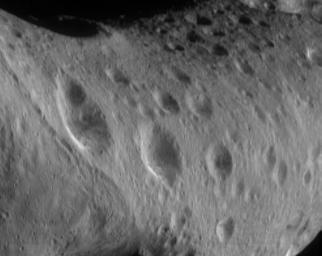
|
Eros’ North Polar Region
- Click the image above for a larger view
- Full-Res JPEG (492 x 392) (24.6 kB)
- Full-Res TIFF (492 x 392) (181.1 kB)
Caption:
On March 11, 2000, this image of Eros' north polar region was acquired by the imager on the NEAR Shoemaker spacecraft, from a range of 206 kilometers (127 miles). The area shown in the image is 10 kilometers (6.2 miles) across. Most of the north polar region is heavily cratered but the region to the left (part of the "saddle") has a lower crater density, indicating that the surface has been modified since it first formed. Eros' rotational axis lies nearly parallel to its orbital plane, much as with the planet Uranus, giving the asteroid exaggerated "seasons." Now, it is northern summer and the north pole is in continuous sunlight. The Sun will set there this June, at Eros' equivalent of Earth's autumnal equinox. At that time, Eros' south pole will begin 12 months of continuous illumination while the north pole remains in darkness.
Background Info:
Built and managed by The Johns Hopkins University Applied Physics Laboratory, Laurel, Maryland, NEAR was the first spacecraft launched in NASA's Discovery Program of low-cost, small-scale planetary missions. See the NEAR web page at http://near.jhuapl.edu/ for more details.
Cataloging Keywords:
| Name | Value | Additional Values |
|---|---|---|
| Target | 433 Eros | |
| System | Near Earth Objects | |
| Target Type | Asteroid | |
| Mission | NEAR Shoemaker | |
| Instrument Host | NEAR Shoemaker | |
| Host Type | Orbiter | |
| Instrument | Multi-Spectral Imager (MSI) | |
| Detector | ||
| Extra Keywords | Crater, Grayscale, Rotation | |
| Acquisition Date | ||
| Release Date | 2000-06-10 | |
| Date in Caption | 2000-03-11 | |
| Image Credit | NASA/JPL/JHUAPL | |
| Source | photojournal.jpl.nasa.gov/catalog/PIA02490 | |
| Identifier | PIA02490 | |
